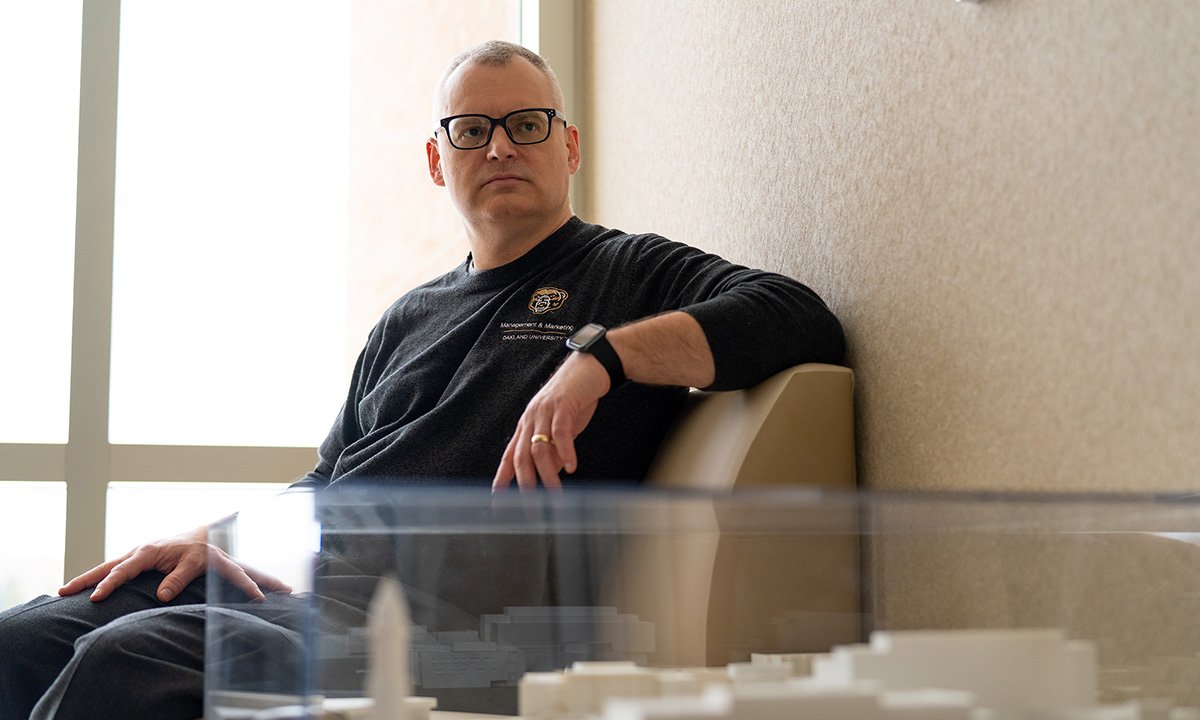Leadership Across the Lifespan
Research addresses bias and work-life balance
Gregory Thrasher loves it when students tell him they haven't yet settled on a career.
"It’s great to have a variety of experiences – that’s how we find out what we hate and what we love,” advises Dr. Thrasher, Ph.D., assistant professor in the School of Business Administration's Department of Management and Marketing.
A myriad of life lessons influenced his research and teaching interests.
"I owned a construction company in Alberta," he says. "I became very interested in why people do what they do and what motivates them.” Earning his Ph.D. in industrial psychology fostered a deeper understanding of leadership.
"Successful leaders, whether in business or politics, are all able to rally people," he reflects. “We all carry unconscious biases about race, gender, age, education and job type. If we're unaware of these biases, it can lead to ineffective decision making. Effective leaders are able to critically evaluate others, while leaving their assumptions at the door.”
Dr. Thrasher ensures his business students are practiced at analyzing today’s plethora of information from all angles, withholding personal notions, which reduces stereotyping of people and situations. Many of today’s college students are victims of stereotyping — as the so-called millennial generation, they are frequently saddled with the most selfish/narcissistic generation label. A 2019 Princeton research study, using charitable donation data, found no evidence to support this label.
“Students in my classes participate in a semester-long data collection regarding their motivation levels,” explains Dr. Thrasher. “The results are always extremely different among them. This helps us understand why millennial or boomer labels are meaningless. We need to understand each individual as a whole person.”
This holistic, individualized approach ties into Dr. Thrasher’s recently published research paper on aging in the workplace: “Getting Old at the Top: The role of agentic and communal orientations in the relationship between age and follower perceptions of leadership behaviors and outcomes.”
“Researching aging at work is really about understanding diversity at work," Dr. Thrasher explains. "It’s not about how to lead a young versus older person; it's about developing leadership skills that allow you to understand the individual needs of each employee."
Dr. Thrasher began investigating this topic as his father was retiring from a leadership position.
“It opened my eyes to this hugely ignored area of how leadership changes across the lifespan. We need to foster workplaces that understand lifespan development and how to keep workers motivated and healthy across all stages of life,” Dr. Thrasher says.
Dr. Thrasher's aging-at-work research highlights the efficacy of using the more tailored approach, offering employees a reasonable amount of autonomy to craft their own work roles. For instance, in some cases, aging leaders may wish to participate in well-defined mentorship programs; in other cases, the preference may be to receive necessary updated skills training, to stay relevant, confident and respected by coworkers.
In a similar vein, Dr. Thrasher's recently published “Eldercare and the Psychology of Work Behavior in the 21st Century” research brings to light the importance of a work-life balance for employees. The research focuses on employees who juggle a caregiver role with elderly parents and, sometimes, children still living at home.
“Work-life conflict can be very broad in nature,” says Dr. Thrasher. “Whether it’s eldercare, childcare or for physical/mental health reasons, people need to be trusted by their employers to balance their own work lives. While domain specific programs are great (i.e., paid leave for eldercare), programs such as flexible work arrangements allow people to most effectively address their specific needs.”
Dr. Thrasher continues to push research efforts forward, enthusiastic about tackling tricky issues related to the psychology of leadership.

 April 07, 2020
April 07, 2020
 By Mary Gunderson-Switzer
By Mary Gunderson-Switzer



